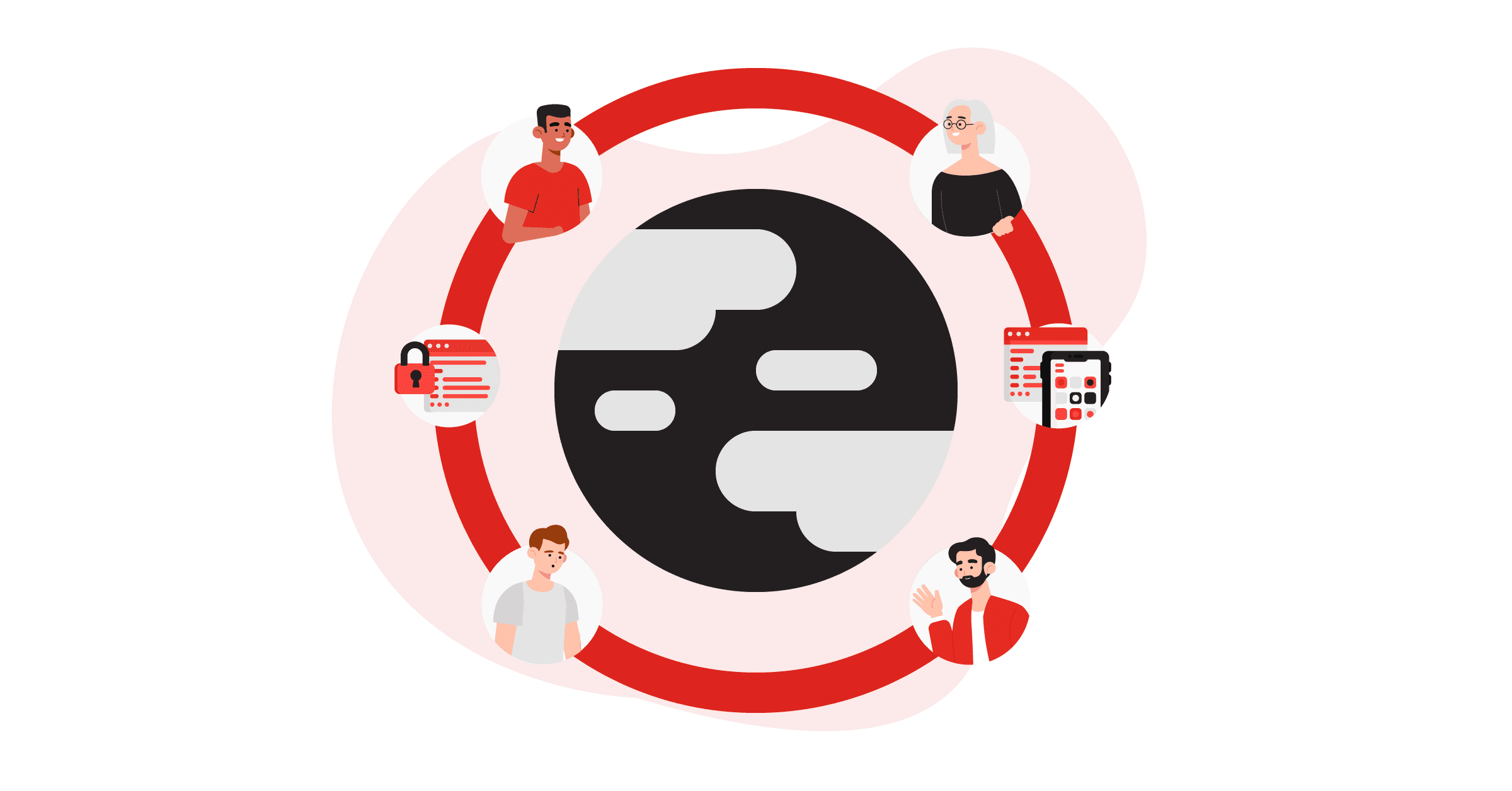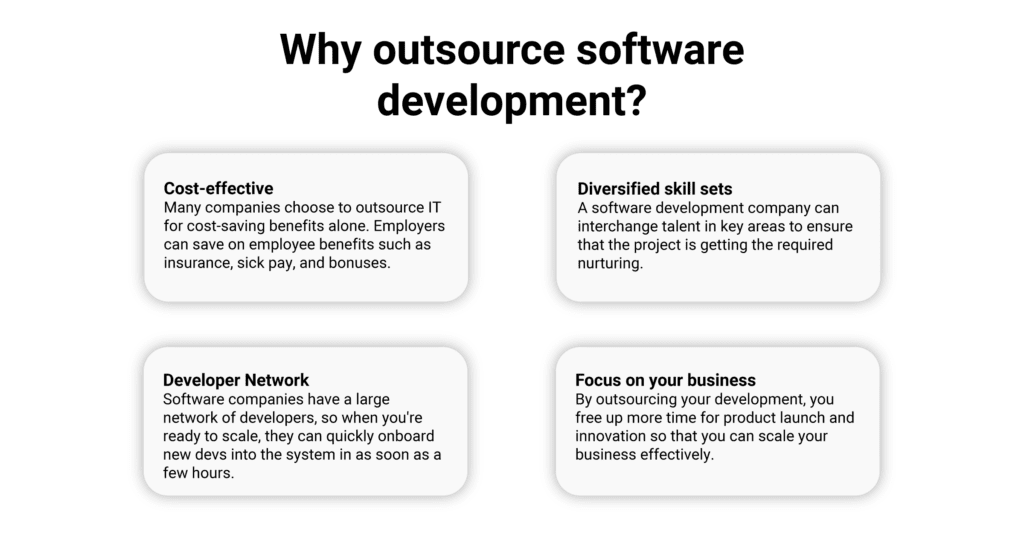What is Outsourcing Software Development?
Learn how to outsource software like a pro! Explore this in-depth guide, guaranteeing smooth partnerships, high-quality solutions, and budget savings.

Software outsourcing happens when companies decide to have custom software solutions built by a third party. Outsourcing software development has many benefits such as cost savings, increased efficiency, reduced risk, and improved security.
In today’s highly digital business environment, companies can reach the world’s best software developers. Both well-known companies and new ventures are using software outsourcing to create their products.
But that’s not all. Let’s examine more closely what software development outsourcing is and how it can help your business.

Software Engineering: What Does It Mean?
Software engineering is one of the most important activities in today’s world. It is the engineering branch that concentrates on developing software solutions for various purposes. Software engineering uses a set of principles, methodologies, and best practices to create high-performing, scalable, and secure software.
While that definition may suggest that software engineering is the same as software development, the truth is that the former focuses on the engineering part. That means that software engineering relies on scientific knowledge to design and build software solutions. That way, software engineering applies accurate practices at the core.
The Global Strategy of Software Outsourcing
The software development industry is always changing due to the fast evolution of technology. New programming languages are created, new methodologies are constantly invented, and old practices are replaced by more innovative ones. That’s why software outsourcing as a global strategy is so important for businesses today.
At AllCode, we are a fast-growing outsourcing company and we aim to push the software development industry forward. Our high-quality outsourcing services help companies from all over the world to quickly fill any skill gaps in their teams, preparing them for digital acceleration in the long term. Software outsourcing providers are now seen as valuable business partners who can contribute to growth. Specialized development areas like blockchain, cloud computing, and the Internet of Things are not a problem for small and medium-sized businesses that lack an in-house development team.
Large enterprises have also embraced software outsourcing as a global strategy. You can see from AllCode’s Success Stories that TrueAccord trusts us with ETL engineering. Remitter is one of our main clients in telecommunications, and Let’s Play User is using our services to deliver their infrastructure and mobile apps.
The Advantages of Software Outsourcing
Outsourcing software development has many advantages, such as:
AllCode
At AllCode, we work with the Top 5% of Tech Talent. We get over a million software developer applications per year, and we choose and hire less than 5% of the most skilled software engineers.
Existing Infrastructure Enhancement
Outsourcing development helps companies reach their vision by outsourcing skills they don’t have in-house.
Turnaround Acceleration
Outsourcing can speed up the software development process without sacrificing quality. Working with experienced developers who know the principles of your project can boost your product’s time to market.
Costs Reduction
Outsourcing allows companies to focus on their core business functions and allocate their time and resources to solving capacity issues. This is a great way to improve cost-efficiency.
Flexibility
When you outsource a software project, you only pay for the expertise that you need. It reduces stress on internal staff and frees up company time to focus on the day-to-day running of the business.
Risk Mitigation
A software outsourcing company can help reduce the risks of developing your project. An experienced team will be able to anticipate potential problems and detect errors through rigorous testing and QA practices.
Responsibilities Fulfillment
An experienced outsourcing team will have solid workflow processes in place to ensure that progress is tracked, milestones are achieved and projects are finished on time.
At AllCode, we conduct feasibility studies as part of our outsourcing process to provide technological and budget validation. We provide proof of concept, develop prototypes, and implement quality assurance testing to minimize the risks early in the product development cycle.

How to Outsource Software Engineering and What You Can Gain from It
Outsourcing software engineering is a complicated endeavor with many related challenges and risks.
However, you can achieve great results with the help of a quality software engineering partner and a clear process to guide you. And while that process might vary from company to company and industry to industry, we can summarize it in 5 key steps that determine how it all works.
Project definition
The first step involves defining the objectives and scope of the project at hand. Here, you establish what you want to build, how much you can afford to spend on its development, the goals you aim to reach, and the overall timeline. You need to do all this before even considering outsourcing, mainly because you need a full understanding of your project to decide which type of outsourcing engagement you’ll need.
Outsourcing research
Equipped with your project details, you can now go out and research the available outsourcing companies that might complete your project successfully. This means you’ll need to look for suitable companies with the expertise and industry experience your project needs. This is a thorough process that will have you shortlisting outsourcing companies, understanding their services and models, and evaluating their quality, experience, reputation, and processes.
Project start
Once you have chosen the outsourcing company that better meets your needs, it’s time to start your project. In other words, you need to meet with the outsourcing team, explain your goals, and plan the roadmap ahead. It’s very important that you define your involvement in this step so you know exactly what to expect moving forward.
Software engineering
When the strategic plan is ready, the outsourcing team can start working on the software engineering process itself. Depending on the engagement model you’ve agreed to, this can mean different things:
Start work with your in-house team supported by the outsourcing professionals
Outsource the part of the project you need the outsourcing company to do
Outsource the whole project for the outsourcing company to work on
Which option you end up choosing will depend on your own requirements. You might go with staff augmentation to fill your team’s skill gaps, outsource a part of it that goes beyond your team’s capabilities, or outsource the whole project to have the ability to focus on other, more urgent activities.
Project completion and beyond
The outsourcing team will follow the agreed map and provide the deliverables according to the predefined timeline. Naturally, this process will have many changes and modifications based on your feedback. The logical conclusion is having the software ready but that doesn’t necessarily mean the process ends there. Depending on the type of project, the outsourcing partnership may continue to provide maintenance, updates, and further development.

Software Outsourcing: The 3 Main Options and How They Work
There are 3 main software outsourcing models that companies can pick from. Each model has its own benefits. The outsourcing model that fits your project will depend on its complexity, your budget, timescale, and involvement level.
The easiest form of software outsourcing is the staff augmentation model, where an outsourced team works with your internal team to develop the software. Augmented teams usually have direct contact with existing staff, often working from your offices until the project is done.
The dedicated team model offers outsourced talent which has more control over the project. Our Delivery Teams thus provide management structure, assigning specific tasks and tracking workflow. In this way, you benefit from the expertise of highly-skilled developers who provide a specific service.
With a project-based model, the outsourcing company manages the whole software development process, from defining the specification to assigning workflow, setting timescales, and quality testing.
Best Outsourcing Locations
You already know the benefits of software outsourcing and the custom solutions you can get from it. But you might face a hard fact: the world is a big place, and finding the right outsourcing partner can be difficult. To make this process easier, the first thing you need to do is look at the best regions for software outsourcing and whether you should choose nearshore or offshore outsourcing.
Today, most businesses (especially those in the U.S. & Canada) like to outsource their software development needs to Latin America. Why? Because Latin America simply has more advantages than other regions, such as timezone alignment, a huge talent pool, cost-effectiveness, geographical closeness, and many more.
With that said, these are the best outsourcing locations in Latin America.
Argentina
No one can argue that, right now, Argentina is one of the most favored countries for outsourcing software development. This country has some of the most skilled software developers in the world, and their large talent pool is making a difference everywhere in the field.
Colombia
Colombia is maybe the most tech-driven country in the Latin America region. As an interesting fact, Medellin, one of the country’s most thriving cities, is known as “The Silicon Valley of Latin America” because of the many software development companies there.
Brazil
As the biggest country in Latam, Brazil is good at outsourcing many goods and services—but software development is one of the things it does best. The creative mindset of Brazilian developers has driven the growth of many projects.
Mexico
Mexico’s convenient location and top talented software engineers have made it one of the top options for outsourcing software development in the world. If your company is based in the U.S., then Mexico is always a good choice for outsourcing.
AllCode’s 3 Steps to Outsourcing Software Development
To make your project run smoothly, here are our 3 steps to outsourcing software development:
#1 Assess Your Team’s Skills
Before outsourcing software development, you need to know what expertise you need. Assess your team’s skills and find any gaps in their abilities. Once you know what skills you need, you can make a project specification, explaining what the product should do and how the work should be done. You can then contact the outsourcing companies on your shortlist and choose the one that will be a good partner.
At AllCode, we review the project specifications carefully. Our workflow is marked by our unique design-thinking mindset, which ensures that every project is delivered on time. We have a 5-step approach to software development: empathize, define, ideate, prototype, and test. This methodology allows us to complete projects quickly without sacrificing quality.
#2 Check the Quality of Outsourcing Companies
Before you agree to hire a software development company, check their reputation in the market. Look at their website and read their case studies. You should also check third-party review sites and their social media channels to see how they’re ranked in the industry.
Finally, you should contact their previous clients to confirm the quality of their work. At AllCode, we’ve worked with clients such as TrueAccord, Twilio, and Let’s Play Soccer, to name a few.
#3 Set Up Project Management Processes
Once you’ve picked your software outsourcing team, project management tools need to be set up to track progress. Platforms like Basecamp, Trello, and Jira allow tasks to be assigned to specific developers. They also enable communication between the client and developers through calendars and messaging threads. Your outsourcing company should assign an Engineering Manager and Team Leaders to ensure that milestones are reached and responsibilities are fulfilled.
The key to outsourcing software development successfully is communication. When communication channels are open, projects can move forward efficiently and launch on time. Remember, it can take time to find a software outsourcing company that you want to work with long-term. The impact that outsourcing development can have on your business makes the research worth it.
At AllCode, we provide highly skilled software engineering teams with the Top 5% of Tech Talent. We provide delivery of software projects to companies of all sizes, from startups to global corporations. We’re driven by an Agile mentality, powered by technology and led by talent.
